I’m trying to process AHS: Murder House
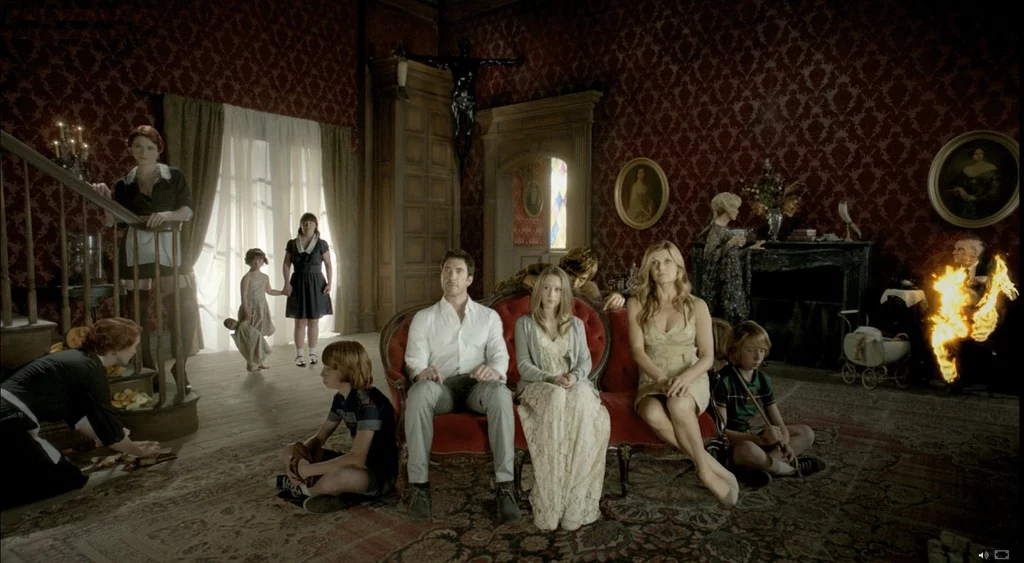
I decided recently that I wanted to rewatch American Horror Story in its entirety, from start to finish, and I’m not really sure why. I’ve got this ongoing struggle with the creations of Ryan Murphy and Brad Falchuk, mostly because my reactions to American Horror Story as a franchise have been mixed at best. I wanted to like it, and for the first couple of seasons, I kind of did. But something about the third season, Coven, was where things started to take a turn for me. From that season forward, it felt like every season had this amazing concept to run with, and the first few episodes actually did a great job of building upon that concept. But then, around episode four, shit went sideways and I never finished the seasons, because I found the writing completely offputting in a myriad of ways. It seems to me, and I don’t think I’m alone, that Ryan Murphy has a flair for taking things to a ridiculous place, often throwing in too many ingredients into the pot and thus, rendering the finished product an unpalatable mess. Go figure. I didn’t watch Glee, but I distinctly recall every person I ever knew who was a fan of the show seemed to be habitually pissed off at its creators, who are none other than the creators of American Horror Story, and with the way each season was shaping up, I could begin to understand why… even with no true frame of reference.
But then, something interesting happened. I started watching American Crime Story.
American Crime Story is another anthology series, also from Ryan Murphy and Brad Falchuk, that takes aim at trying to recreate dramatized versions of big true crime events, seemingly centered around the 90’s. So far there are three series runs of that: The People vs. OJ Simpson, The Assassination of Gianni Versacci, and Impeachment. I’ve watched all of them, and they definitely have that noticable touch of Murphy and Falchuk, but I can tell they’ve been hamstrung by the bounds of reality: there is some semblance of restraint they must show for the curveballs they often throw into a season of something like American Horror Story, if only because they have to attempt to respect the real-life stories they’re trying to portray. That isn’t to say they don’t take some extreme liberties with the truth, but all in all I genuinely found each season of American Crime Story to be enjoyable. Although I was much less interested and far more ambivalent towards Impeachment, I found Sarah Paulson’s portrayal of Linda Tripp to be, as expected, transcendent – the woman can truly act her way out of a paper bag, and deserves many awards.
Ryan Murphy has gone on to start a series on Netflix that has been of much controversy as of late: Monster – The Jeffrey Dahmer Story. I watched all ten grueling episodes, thought it was genuinely not bad, but was happy to be finished with it. I’m a person who consumes a lot of true crime, because I find the psychology fascinating from both sides of the story, and additionally because I’ve been through some trauma, I sometimes find a strange solace in the process of learning about what makes a monster tick. Perhaps it is so that I can continually process the “why” of my own trauma, but I digress. I do not think any of it is cool, and I do not celebrate serial killers. These are awful humans who have done awful things, and they deserve nothing but the harshest ire of the masses. But again, I digress. While Evan Peters does well as Dahmer, you can tell the affinity for both the subject matter and the muse that Murphy possesses while watching Dahmer, which I think feeds into some of the controversy and makes the overall tone of the show really weird and uncomfortable. The larger controversy of the show however, is of course a lot of other stuff: from behind the scenes stories of staffers, to Netflix and Murphy failing to actually work with families or even get their blessing to portray some things in the series. Which is icky, and worth a rant all its own. I also watched The Watcher, another Ryan Murphy joint that is based on a real-life story about a house that receives a number of creepy letters. The Watcher is clearly where the embellishment energy denied in Dahmer was re-routed in Murphy’s creative process, because holy shit – what a wild and often frustratingly asinine piece of television. I was entertained, but I also finished the show feeling the same sense of frustration I often did during any viewing of American Horror Story.
I won’t even get into American Horror STORIES yet, a singular anthology show that has some stand-alone stories, but also tries to embellish on some of the lore of American Horror Story seasons past.
So…. given my feelings, why am I even embarking on this journey in the first place? Well, quite simply because I feel like enough time has passed between my initial viewing of AHS and my numerous failed attempts to like the show that I’ve changed a bit as a person, and I might see the show in a different light then I had before. I find this often is the case when I watch older stuff: I didn’t absorb it in the same way, at all, when I was younger. Now that I’ve got some more experience under my belt, perhaps I’ll feel different.
Therefore, allow me to start where it all begain. Murder House.
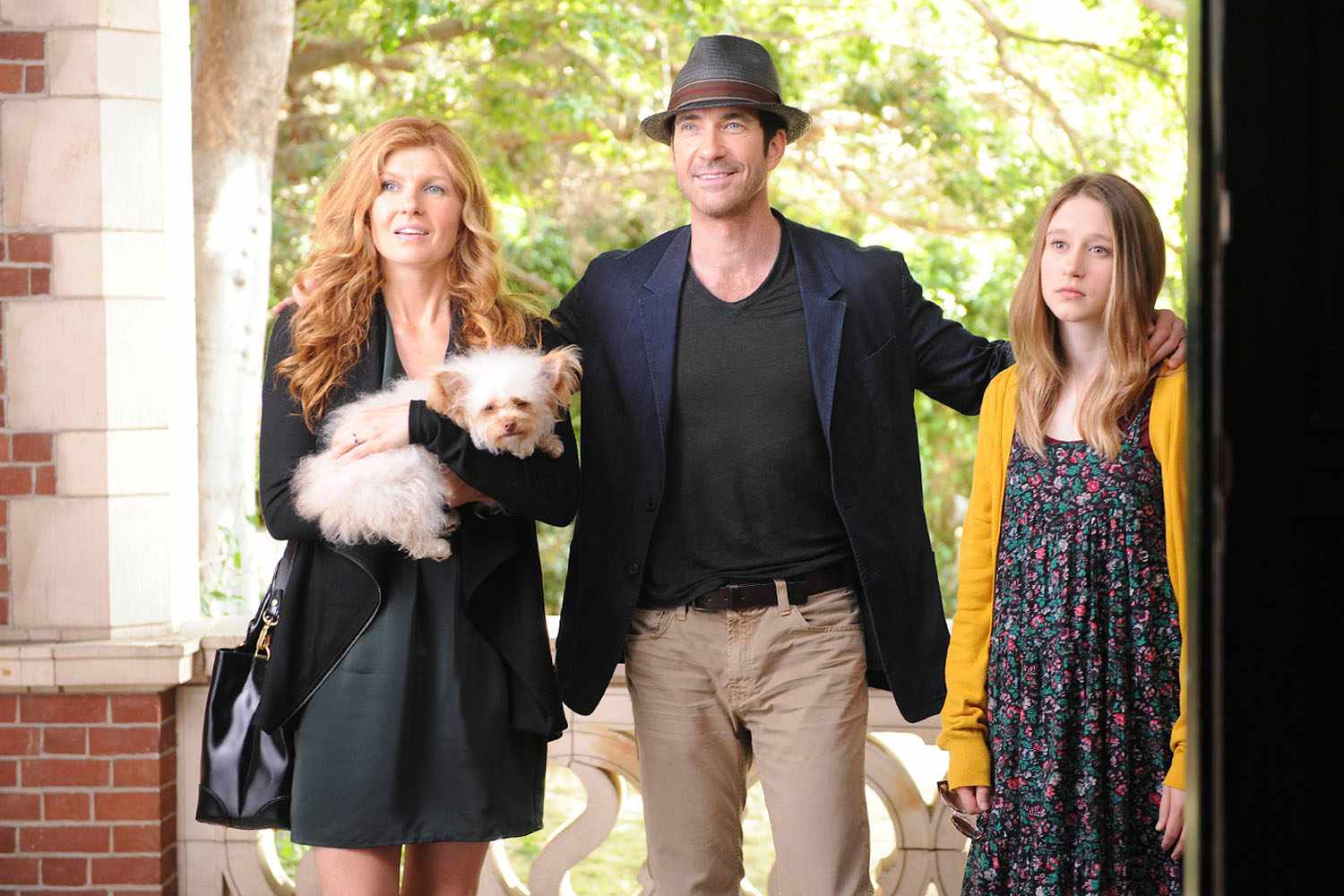
Murder House
This is the inaugural season of American Horror Story and arguably the best of the bunch, if only because they hadn’t been given the confidence to keep going despite a lack of better judgement. The season kicks off with a creepy old house, and an adorable little girl standing in front of it: the year is 1978. Two ginger nightmare twins the come into the scene and walk into the house to fuck some shit up with bats. Before entering, however, the adorable little girl gives the boys a foreboding warning: “You are going to die in there.” However, nothing is stopping the twin energy from entering, so they dismiss her words and head in. I’d say they messed up the house a lot, but the house was clearly dilapidated and in need of The Property Brothers’ assistance. Amidst the chaos, the boys start to see some weird things: a dead possum, some doors moving on their own, but nothing phases them from continuing their exploratory journey through the old creepy house – so naturally, to the basement they go. One of the kids decides he’s done with the atmosphere, and begins to head upstairs. But then he gets a feeling his twin is in trouble – intuition, I guess – and he heads back down to investigate. He finds his red-headed counterpart laying, bloody and struggling to breathe, when the other one turns around just in time to see a strange, small figure charging towards him angrily. And thus sets the tone for Murder House, because you already have a lot of questions, and yet you feel like you already know the tropey answers.
After this chance encounter we end up in a doctor’s office in modern day (circa 2011) with Vivien Harmon, who has clearly just suffered some devastating news from the doctor’s office. She’s had a miscarriage. She heads home, and hears a noise in the house. Thinking it’s an intruder, she grabs her phone and a knife – smart woman – and heads up the stairs to investigate. What she ends up finding is her husband Ben in bed with one of his students, which gives us our main driving story behind the whole season, and a few themes to work with: namely infidelity and childbirth, but a lot more you could potentially say about a number of subjects if you want to look deeper. A few months after all of this happens, Ben and Vivien decide amidst all of the tragedy and infidelity that they’re going to move across the country with their teenage daughter Violet from Boston to Los Angeles, because nothing fixes marital issues then a change of scenery I guess. They arrive at the murder house, though they don’t know it’s the murder house, and they’re all pretty much kind of in love with it. The realtor eventually confesses that a previous couple was murdered in the house, but no one really seems to care that much, and they end up taking the house. Of course, we learn more about this as the show goes on.
Now… Violet is more or less like I was in high school: angst turned up to eleven draped in 90’s pastiche and sullen disposition. We learn pretty quickly who the cast of characters is, at least on a face value – there’s intrusive neighbors Constance and Addy. Remember the cute little girl from the beginning? That’s Addy, who is now much older, but still living with Constance due to her disability. There’s a maid, who for some reason is played by TWO actresses (Frances Conroy and Alexandra Breckenridge) and I feel like that wasn’t entirely explained to me. I mean, they try: the idea is that men see what they want, therefore they see a very buxom and overtly sexual younger maid, where women see things for what they really are, which is an older more reserved maid. I didn’t entirely understand this because of the things we learn later, which ….I’ll get into. We also learn that Ben is a psychiatrist, and he is taking patients in his home office. One of the patients we meet, who becomes a staple to the series, is Tate Langdon. Obviously, Tate and Violet hit it off pretty early on – the angst and disdain that Violet feels about school and her classmates is mirrored in extremes by Tate, which we also eventually learn about. We also eventually get to know about some of the house’s history, which is drip-fed to us throughout the entire season. I would say one of the standout pieces of imagery and a centerpoint for the simultaneous reactions of “what the fuck” and “ooo what is this” is the scene near the end when the figure known as “Rubber Man” begins to appear. The family, while looking through the home, find a bondage suit just randomly hanging in the attic. They make some jokes, but Ben ultimately throws out the suit. Later on, Ben and Vivien have an argument, and then have some make-up sex. After that even, but the same night, Ben sleepwalks to the kitchen and lights the stove, and Vivien has a sexual encounter with the rubber man while thinking it’s her husband. It’s very weird altogether, but gives you some intrigue up front: who is the rubber man, and what the fuck just happened with all of that?
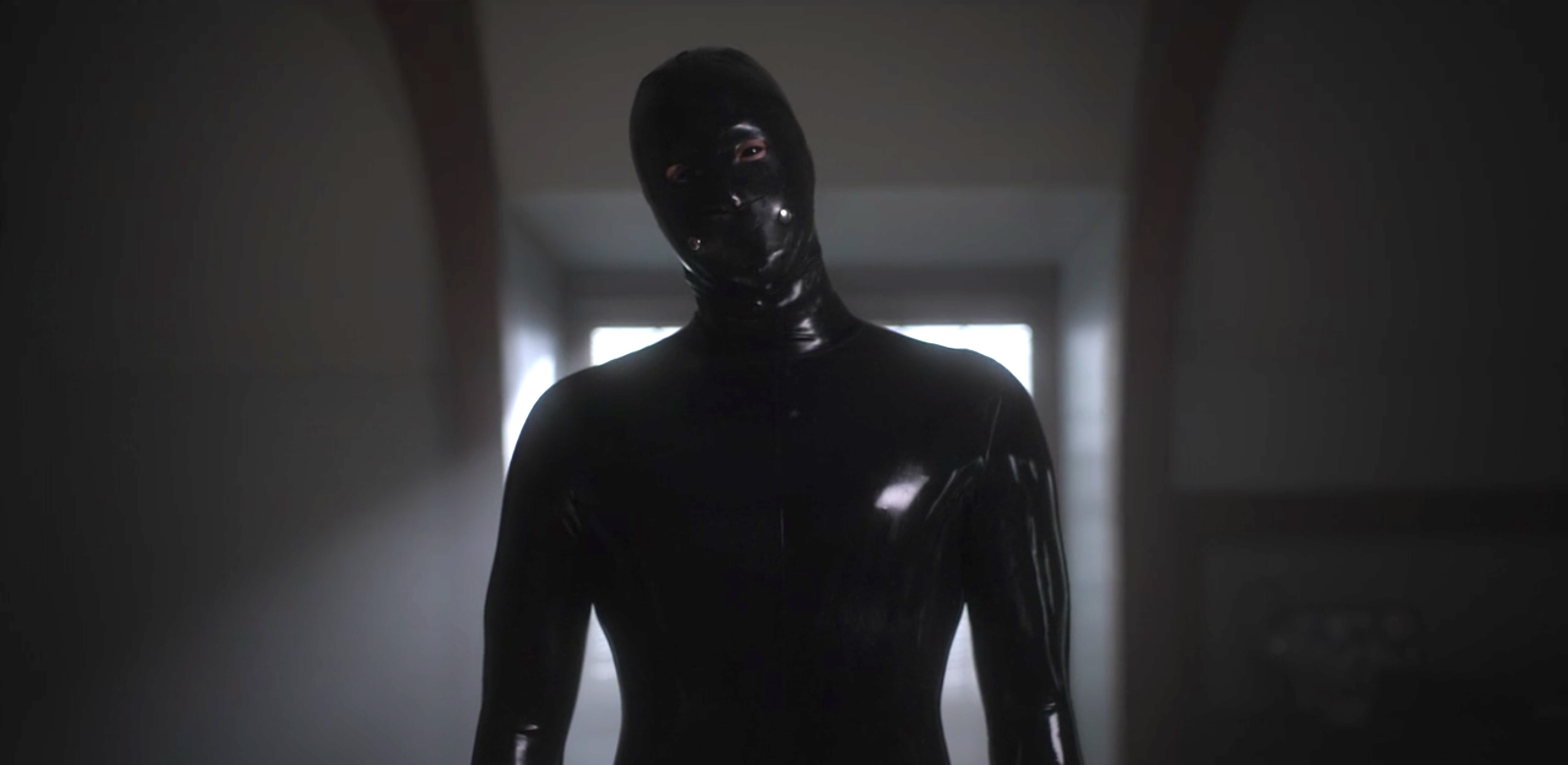
I’m trying to figure out how deeply I wish to go with this, because it’s not entirely a recap… but to some extent, I have to process all of the things they try to pack into a season, which sort of makes it a recap. And again, I’m doing all of this if only to ask myself: WHY? Anyways, let’s continue.
Murder House has a sordid past. The couple who lived in the house before, the one that the realtor talked about, did indeed die in the home before. We also learn that a couple of women who lived there in the late 60s were murdered there by a man that I think was supposed to be an imitation, if not actually, Richard Speck. This seems to be an early sign of Murphy’s penchant for twisting the truth and playing with alternate universes, but at the time I don’t think anyone really thought about it beyond the surface level value it offers. Based on this encounter from the 60s, a group of serial killer obsessed youths in the present time try to reenact the faux Speck murders when they break into current-day Murder House, owned by the Harmons, and hold Vivien and Violet hostage. Tate helps out the ladies by basically taking out the killers entirely and in a similar fashion to his disposal of one of Violet’s school bullies. Except, he doesn’t kill the bully, but he does kill the would-be killers. I actually think he subtly suggests that Violet lead them to places in the house, so he can deal with them. Either way, business done and the Harmon ladies manage to live through the ordeal. And obviously, Vivien wants to move again. But they can’t, really – the purchase of Murder House has sunk them in a little too deep, and Ben knows it. Speaking of Ben… where was he during this whole attack?! Well, we’ll get to that later, too.
While all of this is going on, we’re beginning to learn the true nature of the house – the people who die in that house, stay in that house well beyond death. Spiritually, that is. We learn that the maid, Moira, was murdered there by the next door neighbor Constance, who apparently used to live in the home and found her husband forcing himself on Moira. I believe that this is probably the explanation for Moira’s double visage, and one of the hallmark clips of social commentary that we get from Murphy and Falchuk, if only a subtle one. Ben cheats on his wife, or has in the past, and takes her for granted. He’s known to objectify women, an assumption backed up by his perception of Moira as a hypersexual maid. I’m still not entirely sure if this means Moira just has a really old soul, or why this conceptual logic doesn’t seem to apply to anyone else in Murder House, but this is part of why I’m watching the entire series again – I’m hoping to pick up on these little things.
We start to learn more somewhere in the third episode about the deeper history of the house from a tour of creepy haunts that frequently runs by the home, seeing as it has such a sordid history that it’s one of the main stops on this tour known otherwise as “The Eternal Darkness Tour.” We learn a big lore drop, actually: in the 20s, a surgeon named Charles Montgomery moves to Los Angeles with his austere wife Nora, where they build the murder house while he works on his practice from the property. But we also learn that Charles is kind of a madman, because he’s frequently huffing ether and sewing people together on a regular basis. Yikes! Nora is also a monster of a different sort, because her thirst for opulence knows no bounds, and in her quest for money and power she ends up tricking several women into having abortions by way of her cracked husband in the basement, in order to recoup money but in some ways I think she was externalizing her resentment about being a mother, despite wanting a baby, and then having one and neglecting it. I do find a lot of the lore building of these characters deeply interesting, and it’s one of the things I definitely enjoy about the show.
So anyways, Charles and Nora do have a son named Thaddeus, who is eventually kidnapped and killed by the boyfriend of one patient, who is out for revenge. The boyfriend sends Thaddeus back to the couple in pieces, and naturally because Charles is some kind of Dr. Frankenstein knock-off, he pieces Thaddeus back together. Thaddeus is what we see in the beginning of the show charging after the ginger twins, and is colloquially known in the fandom as “The Infantata”. I’ve no idea why, but I gather there will be more lore down the road. Apparently the inspiration for this entire story is based upon the mythology and real-life story surrounding Charles Lindbergh and the kidnapping of his two-year old son. Again, the borrowing of real-life atrocities seems to be something Murphy and Falchuk do a lot of. A lot of people do it, I’m just now taking notes on how often I see it here.
If you’re not following any of this, I don’t blame you. It’s a clusterfuck.
So anyways, we eventually learn from Tate, first via his getting to know Violet, and later through this world building, that Nora acts as a bit of a mother figure towards Tate by telling him how to get The Infantata, or any other ghost in Murder House, to leave him alone, and it’s so stupid simple I’m going to try it next time I feel scared of something that isn’t there: all you’re supposed to say is “go away” or some shit. I don’t know, it worked for him!
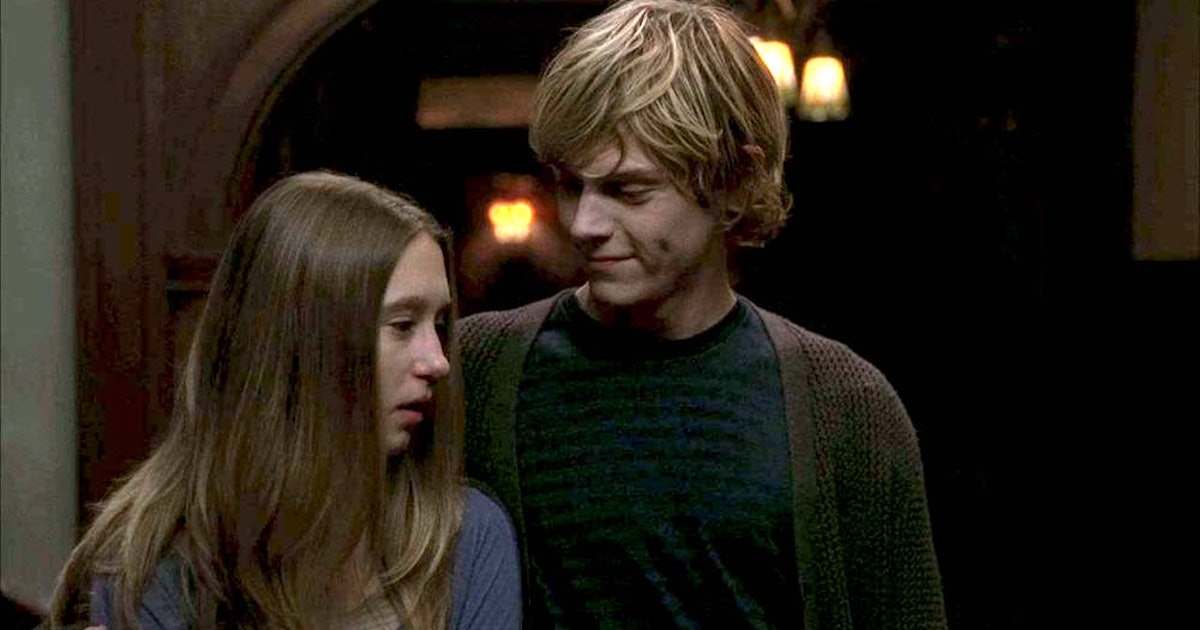
Speaking of Tate, I haven’t even gotten into his story. See, the tangled web of stories that are just shot out at you in Murder House all end up coming together in a somewhat nice little package, because we’re often confused about who is what and where did they come from: we learn eventually, over time, that Tate is actually Constance’s son, and that he’s also a spirit that lives in Murder House. Tate superseded the events of Columbine by several years at his local school when he apparently decided to enter one day, fully armed, to take out several of his classmates. The police eventually came to the home, and shot him all up. It sounds unbelievable, yet totally believable – I know.
We also learn about the origin of Rubber Man to *some* extent: the suit originally came into the house with the previous couple that owned the house before the Harmons. Patrick and Chad were having marital issues and also thought that moving into a new house would solve everything, which I guess must be a thing. Chad thought that Patrick was cheating, and furthermore thought that he was into BDSM, so he bought the suit to try and take an interest in what his partner liked. The suit was a flop, and never got used by either. However, Tate decided to use it, and use it he did. We learn after several episodes, namely when we learn about the mother/son bond between Nora and Tate, that Tate was sad for Nora. Nora’s ghost sat in the basement constantly and grieved over the loss of Thaddeus, and Tate wanted to help her. He promised to get her a child in exchange for her motherly comfort, and when Patrick and Chad’s marital issues proved to be too big for them to mend, Tate realized a child was not in their future. So he killed them, and all the ghosts hoped for new tenants. The Harmons are what they got, so Vivien’s encounter with Rubber Man was actually an encounter with Tate. AND IT GOT HER PREGNANT! This baby was meant to be the promised child for Nora, which… well, doesn’t go as expected: she’s a bad mother, she simply does not want to deal with the actual responsibility a child brings. Anyways, I believe this loops back in to the larger universe of AHS as the series goes on, but as I’ve said… it’s a long journey, and I’ve only been able to stomach so much in the past.
This whole season is a web of crazy shit that ends up in this crescendo of pregnancy woes and “we have to take care of this baby” because everybody seems to care about it. Everybody is trying to help. Moira is feeding the baby brains and organs and shit and I don’t even know why that’s happening. Constance seems to care because it’s a fresh young baby to liven up her otherwise dull life, but I think she’s also maybe aware that the baby is her grandchild. Vivien and Ben want the baby because, well… duh. Violet cares about her mother, and Tate has promised this baby to Nora, who in all likelihood doesn’t want a baby at all because she’s a terrible mother it turns out. I’m over here just hoping that Violet doesn’t make any poor choices, but I already know that’s not going to happen because she’s knee-deep in love with Tate, despite them having this rocky on-off chemistry. She’s learning about him, his history, who he is, what he is, and at point she can’t bear the news and tries to overdose. Tate steps in to save her. OR SO WE THINK! Violet actually dies in the home, which is I think supposed to be the big twist at the end. It’s hard to tell, because it’s a very tumultuous path to get to where we are at this point. I mean… they threw in Elizabeth Short at one point, AKA The Black Dahlia, AKA, one of the most infamous and grizzly unsolved murders in all of history. You know, just to be spicy. Again, I can’t be mad because it is a very infamous case. Movies have been made about it. L.A. Noire had an entire case surrounding it. It is an interesting thing to note, though, that they turned her into a coquettish bisexual flavonoid for …I guess our benefit? Her spirit even lived inside of the house, because according to Murphy and Falchuk’s lore, she died in this house in the mid 40s at the hands of a very bad dentist with very ill intentions. Her further mutilation was at the hands of Charles Montgomery. This comes into play again when Constance’s super young boyfriend is also murdered in the house, and disposed of in a similar way. Why? I don’t know. The suggestion is fame. They lost me on that entire piece of subplot, but I’m here for the rest.
By the end of the show, we’re left with little to no hope for The Harmon family, or anything else The Murder House has to offer. In fact, you’re almost kind of just hoping whoever goes in that house just dies, because they were dumb enough to go in there to begin with. The Harmons all end up dying in the house: Vivien to childbirth, Violet to an overdose, and Ben to an entire subplot I didn’t really touch on, which is that of his student mistress Hayden, who enters the picture sometime mid-season to express that she got pregnant and wanted to have the baby. That is where he ends up during the home invasion Vivien and Violet go through, back in Boston with his mistress Hayden to help her get an abortion. She ends up not getting it, coming to Murder House to say she’s not getting it AND that she’s moving in, Ben and her yell a lot, and she ends up dying at the house by the hands of ANOTHER character I didn’t even touch on – Larry, an ex-husband of Constance who has his own sordid history with the house. In fact, throughout the entire season, Larry is trying to warn Ben that he needs to leave, but he’s not completely forthright about his purpose, or his story, and therefore fails to gain Ben’s trust on the matter. And because Hayden was killed on the property, she now lives there, where she just angrily bitches constantly and out of nowhere in this “SURPRISE MOTHERFUCKER” kind of fashion that makes you care about her character even less. Ben dies to her, and the murder trio from the home invasion episode. And what happens to the baby? Well… I think we’ll get to that later. But for now, all we know is that Constance has taken the baby, and hidden him well.
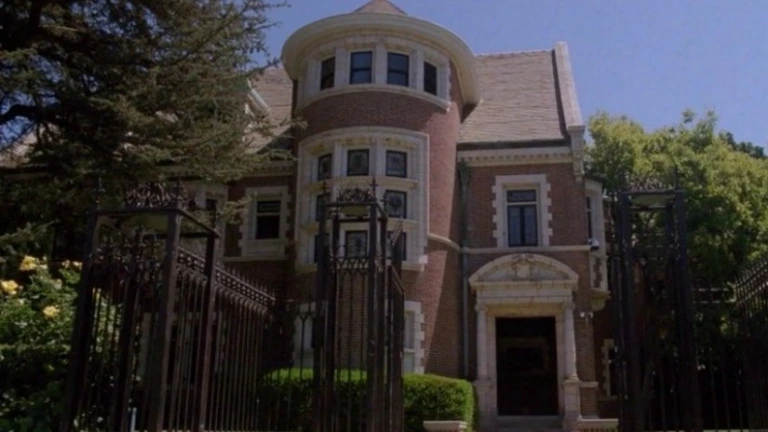
Altogether, Murder House holds up about like I would have expected. I remember watching this when it came out, and finding it somewhat enjoyable, though not mindblowingly awesome. Of course, all of the plot points that are thrown out like angry tendrils looking for something to grab didn’t help, neither back then or in my recent viewing, but I found myself more forgiving of them this time around, if only because I knew what I was getting into.
I intend to watch through the rest of the seasons and give my scattered processing thoughts on them as I see fit, because it’s kind of fun to write about them like this. It’s also just something I’m used to doing, but not entirely used to sharing in this format. I will say that I recently finished season one of American Horror Stories, which is a spin-off show by, of course, Ryan Murphy and Brad Falchuk. I thought it was going to be an individual anthology series, in a similar vein as Creepshow or Tales From The Crypt, and in some ways that’s kind of true. But they also had three exhaustive episodes that brought back Murder House, and I kind of hated that. I can only guess it was fan service, but nothing about the Harmons was even mentioned, nor Tate and crew, and although we saw Addy at one point, the entire plotline presented was mostly just kind of… there. But I also noticed that upon finishing the first episode of season two, they were trying to loop in some starter lore on what takes place in Coven. As I said earlier, Coven is actually what made me start to hate the show, and I’m wildly curious about whether or not my opinion will have changed upon a rewatch. I’m currently almost done with season two, so… we’ll see! American Horror Story is, for all intents and purposes, a primetime soap opera that leans hard into multiple horror tropes, good or bad, and often goes off the rails quickly. If you can latch onto one central theme or plot and follow it through, it seems to be satisfactory. But you’re going to have to take a lot of hits on the way there. And as much as I kind of dread what I’m about to do to myself in rewatching the rest of it… I’m also kind of excited.
